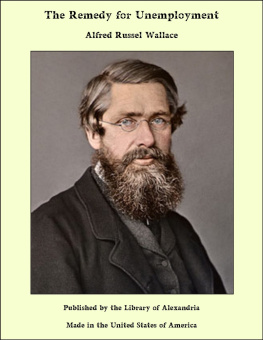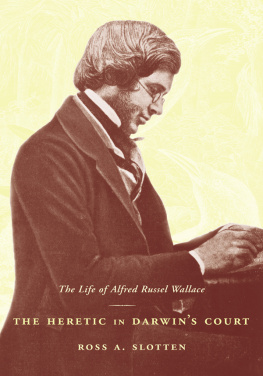| Note: | Images of the original pages are available through Internet Archive/American Libraries. See https://archive.org/details/remedyforunemplo00walliala |
PASS ON PAMPHLETS. No. 8.
1d.
The Remedy
for
Unemployment
ALFRED R. WALLACE
THE CLARION PRESS,
44, WORSHIP STREET, LONDON, E.C.
The Clarion.
Edited by ...
ROBERT BLATCHFORD.
EVERY FRIDAY. - - ONE PENNY.
If you want to keep to understand the Socialism which is creating such a ferment in the country, you must read the CLARION. Order it from your newsagent, or send for a free specimen copy.
5 Clarion Pamphlets.
No. 44FROM BRUTE TO BROTHER.
By DENNIS HIRD, M.A.
No. 46JESUS THE SOCIALIST.
By DENNIS HIRD, M.A.
No. 47.SEVENTEEN SHOTS AT SOCIALISM.
By R. B. SUTHERS.
This is an answer in brief to Seventeen Common Objections to Socialism.
No. 48.THE CASE FOR SOCIALISM.
By F. HENDERSON.
Deals with the Compensation and Confiscation question.
No. 49.THE PERIL OF POVERTY.
By Councillor McLACHLAN.
ONE PENNY EACH - - By Post, 1d.
THE CLARION PRESS, 44, Worship Street, London, E.C.
THE REMEDY FOR UNEMPLOYMENT.
BY DR. ALFRED R. WALLACE.
The reason why I wrote the present pamphlet (which first appeared in the Socialist Review, and is now reprinted in a slightly modified form) was that, although there is a small body of avowed Socialists in Parliament, not one of them has, so far as I am aware, upheld any of the fundamental principles of Socialism as a means of dealing with the greatest of present-day problemsthat of chronic unemployment and starvation all over our land. Let me illustrate what I mean by a few examples. Perhaps the most fundamental and universally admitted axiom of Socialism is that all production should be, primarily, for use and not for profit; and the next in importance is that the true or proper wages of labour is the whole product of that labour.
But neither in Parliament nor out of it has a single voice been raised to show that these principles must be adopted in any permanent solution of the problem, or to explain how they can be applied far more easily and economically than any of the suggested alleviations. All the talk has hitherto been of securing trade union rates of wages for out-of-works of every kind; and the underlying idea has always been that of the non-Socialist workerthat the Government provision of work must not be looked upon as permanent, but only as enabling the worker to live till the capitalist employer again requires him.
An equally non-Socialist view was put forth by one of the most respected Socialists in Parliament when he advocated the immediate construction of light railways all over the country in order that when labour was brought back to the land the products could be carried economically to market, implying that the products were to be sold, thus competing in the market with those of other producers, lowering prices, and altogether ignoring the great Socialist principle of production for use. In the discussion of this question it has been totally overlooked that by a proper organisation of the labour of the permanently or temporarily unemployed, as well as of all those whose employment does not supply them with the means of a thoroughly sufficient and healthy existence, all the necessaries and comforts of life can be produced in our own country, just as they were produced down to a few centuries ago. I will now proceed to the exposition of the whole subject.
In order that those who have not read the Labour Partys Unemployed Workmen Bill may understand why it could not have succeeded, a short statement of its essential provisions may here be given.
The first clause provides that the Local Unemployment Authority under this Bill shall be the council of every borough or district of over 20,000 inhabitants, and for the rest of the county the County Council. Clause 3 declares that it shall be the duty of the Local Unemployment Authority to provide work for him (any workman registered as unemployed) in connection with one or other of the schemes hereinafter provided, or otherwise, or failing the provision of work, to provide maintenance, should necessity exist, for that person and for those depending on that person.
This is the essential part of the clause, with a condition that the wages are to be not lower than those that are standard to the work in the locality. Then there is to be a Central Unemployment Committee to frame schemes, and generally look after the Local Unemployment Committees, which are to be established by every local authority, and are also to frame schemes; and the schemes of the four or five hundred local authorities are all to be submitted to the Local Government Board for revisal or approval. Nowhere is any guide given to the essential principles which should underlie these hundreds of schemes, and we can easily imagine the delay, the confusion, the cost, and the almost certain failure of schemes initiated in so haphazard a manner.
The whole conception of the Bill is, in my opinion, wrong. Unemployment is not a local phenomenal, but national, and even world-wide. It is a symptom of disease in our existing civilisation, and must be treated, if with any chance of success, on broad national lines, and with national resources. Even the one definite suggestion in the Billthat schemes of national utility might be undertaken to employ the out-of-workshowever good in itself, was here altogether out of place. For such schemesafforestation, reclamation of foreshores, drainage works, roads, etc.are all either not reproductive at all, or not for many years, in the meantime increasing taxation, and thus perhaps producing further unemployment; while they could only employ a mere fraction of those in distress (none of the women) and, when completed, would leave the problem exactly where it was when they were started.
The discussion in Parliament showed a clear recognition of the fact that it is quite impossible to remedy such chronic and widespread unemployment as exists now by finding work for the half-starved population in the hundreds of different occupations at which they have been engaged; but, strange to say, no one seemed to be aware that it is by no means impossiblethat it is, in fact, comparatively easyto enable these same people to produce for themselves the primary necessaries of life which are their immediate and permanent need. What is required is to organise and combine the whole of the unemployed into local groups, each group or community being primarily made up of a due proportion of workers who have been engaged in the production of some of these necessaries, and who will form a nucleus for the training of others for similar work. These various occupations are comparatively primitive, and there is every reason to believe that they will be found among the unemployed in about the same proportions as in the whole population. The thorough organisation and careful supervision needed cannot, however, be left to the random, and often antagonistic, opinions of hundreds of local authorities, but must be undertaken by the Central Government itself, and that only when the guiding principles and the practical procedure have been carefully thought out, clearly defined, and fully discussed in Parliament, before being embodied in law. It is pre-eminently a work to be devised and carried out by the Executive Government itself.
I will now endeavour to show in some detail how this can be done, what will be its results, and what are the various facts and arguments which render its success a certainty if it is fully and honestly carried out.








